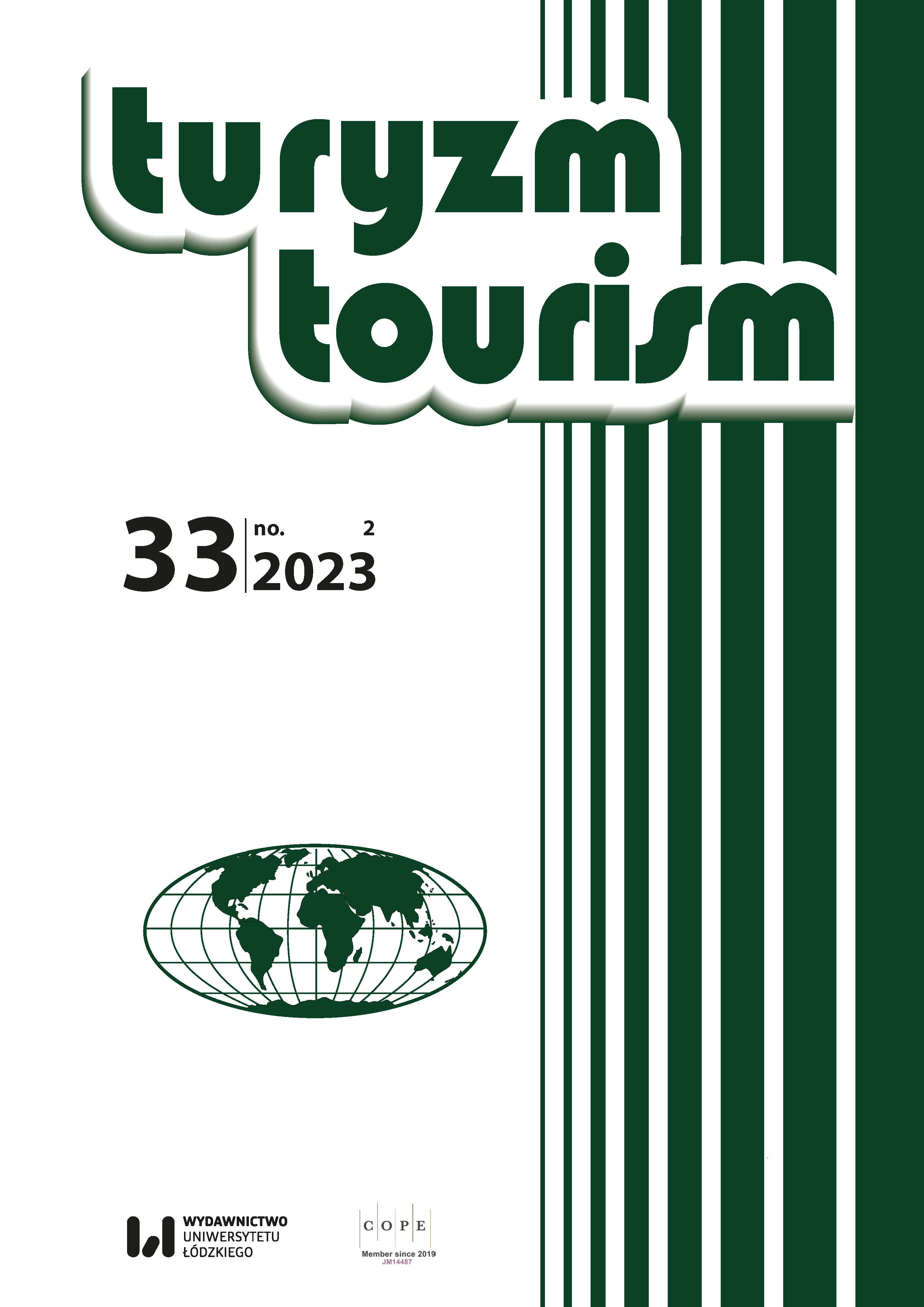Manifesting smart tourism destinations: A study based on selected Himalayan cities in India
DOI:
https://doi.org/10.18778/0867-5856.33.2.04Keywords:
smartness, smart tourism, smart tourism destinations, tourism planning, Himalayan citiesAbstract
In urban planning, the term smartness is considered as a philosophic dimension which enables smarter strategic decisions and directions. The involvement of information technology in the functioning of the daily life of cities is directed towards the development of smart cities. Smart tourism destinations can also implement smartness by employing suitable tourism applications within a smart city. The purpose of the study is to explore the enabling factors for establishing smart tourism destinations in the Indian Himalayas. This research used a qualitative methodology and conducted interviews with relevant stakeholders from the study areas, Jammu and Dharamshala. The data collected were recorded, transcribed and coded with the help of NVivo 12, in order to carry out thematic and content analysis. The findings of the study showcase that community welfare, information communication technology, quality of life, sociocultural heritage, stewardship, sustainable development and tourism resources are the enabling factors for smart tourism destinations in the context of the selected Himalayan cities in India. This study will be beneficial for destination managers for assessing destination smartness, and further, for researchers who want to study smart tourism destinations.
Downloads
References
Benckendorff, P.J., Sheldon, P.J., & Fesenmaier, D.R. (2014). Tourism information technology (2nd ed.). CABI. https://www.cabidigitallibrary.org/doi/book/10.1079/9781780641850.0000
Google Scholar
DOI: https://doi.org/10.1079/9781780641850.0000
Berkwits, M., & Inui, T.S. (1998). Making use of qualitative research techniques. Journal of General Internal Medicine, 13, 195–199. https://doi.org/10.1046/j.1525-1497.1998.00054.x
Google Scholar
DOI: https://doi.org/10.1046/j.1525-1497.1998.00054.x
Blank, R.M., & Shapiro, M.D. (2001). Labor and the sustainability of output and productivity growth. University of Michigan; National Bureau of Economic Research. http://www-personal.umich.edu/~shapiro/blank-shapiro.pdf
Google Scholar
Boes, K., Buhalis, D., & Inversini, A. (2016). Smart tourism destinations: Ecosystems for tourism destination competitiveness. International Journal of Tourism Cities, 2(2), 108–124. https://doi.org/10.1108/IJTC-12-2015-0032
Google Scholar
DOI: https://doi.org/10.1108/IJTC-12-2015-0032
Buhalis, D. (2000). Marketing the competitive destination of the future. Tourism Management, 21(1), 97–116. https://doi.org/10.1016/S0261-5177(99)00095-3
Google Scholar
DOI: https://doi.org/10.1016/S0261-5177(99)00095-3
Buhalis, D. (2003). eTourism: Information technology for strategic tourism management. FT Prentice Hall.
Google Scholar
Buhalis, D., & Amaranggana, A. (2014). Smart tourism destinations. In Z. Xiang, & L. Tussyadiah (Eds.), Information and Communication Technologies in Tourism 2014: Proceedings of the International Conference in Dublin, Ireland, January 21–24, 2014 (pp. 553–564). Springer. https://doi.org/10.1007/978-3-319-03973-2_40
Google Scholar
DOI: https://doi.org/10.1007/978-3-319-03973-2_40
Buhalis, D., & Spada, A. (2000). Destination management systems: Criteria for success – an exploratory research. In D.R. Fesenmaier, S. Klein, & D. Buhalis (Eds.), Information and Communication Technologies in Tourism 2000: Proceedings of the International Conference in Barcelona, Spain, 2000 (pp. 41–58). Springer. https://doi.org/10.1007/978-3-7091-6291-0_43
Google Scholar
DOI: https://doi.org/10.1007/978-3-7091-6291-0_43
Cohen, B. (2014, April 21). The smart city wheel. Smart Circle. https://www.smart-circle.org/smart-city/boyd-cohen-smart-city-wheel/
Google Scholar
Femenia-Serra, F. (2018). Smart tourism destinations and higher tourism education in Spain: Are we ready for this new management approach? In B. Stangl, & J. Pesonen (Eds.), Information and Communication Technologies in Tourism 2018: Proceedings of the International Conference in Jönköping, Sweden, January 24–26, 2018 (pp. 437–449). Springer. https://link.springer.com/chapter/10.1007/978-3-319-72923-7_33
Google Scholar
DOI: https://doi.org/10.1007/978-3-319-72923-7_33
Femenia-Serra, F., & Ivars-Baidal, J.A. (2018). Smart tourism: Implicaciones para la gestión de ciudades y destinos turísticos. In M.T. Cantó López, J.A. Ivars-Baidal, & R. Martínez Gutiérrez (Eds.), Gestión inteligente y sostenible de las ciudades: Gobernanza, smart cities y turismo (pp. 129–151). Tirant Lo Blanch. http://hdl.handle.net/10045/84247
Google Scholar
Giffinger, R., Fertner, C., Kramar, H., Kalasek, R., Pichler-Milanović, N., & Meijers, E. (2007, October). Smart cities: Ranking of European medium-sized cities: Final report. Centre of Regional Science (SRF); Vienna University of Technology. https://doi.org/10.34726/3565
Google Scholar
Gretzel, U., Fuchs, M., Baggio, R., Hoepken, W., Law, R., Neidhardt, J., Pesonen, J., Zanker, M., & Xiang, Z. (2020). e-Tourism beyond COVID-19: A call for transformative research. Information Technology & Tourism, 22, 187–203. https://doi.org/10.1007/s40558-020-00181-3
Google Scholar
DOI: https://doi.org/10.1007/s40558-020-00181-3
Gretzel, U., Werthner, H., Koo, C., & Lamsfus, C. (2015). Conceptual foundations for understanding smart tourism ecosystems. Computers in Human Behavior, 50, 558–563. https://doi.org/10.1016/j.chb.2015.03.043
Google Scholar
DOI: https://doi.org/10.1016/j.chb.2015.03.043
Gretzel, U., Zhong, L., & Koo, C. (2016). Application of smart tourism to cities. International Journal of Tourism Cities, 2(2), 1–4. https://doi.org/10.1108/IJTC-04-2016-0007
Google Scholar
DOI: https://doi.org/10.1108/IJTC-04-2016-0007
Hennink, M.M., & Kaiser, B.N. (2019). Saturation in qualitative research. In P. Atkinson, S. Delamont, A. Cernat, J.W. Sakshaug, & R.A. Williams (Eds.), Qualitative interviewing. SAGE Publications. https://doi.org/10.4135/9781526421036822322
Google Scholar
DOI: https://doi.org/10.4135/9781526421036822322
Hollinshead, K. (2004). Tourism and new sense. In M.C. Hall, & H. Tucker (Eds.), Tourism and postcolonialism: Contested discourses, identities and representations (pp. 25–42). Routledge.
Google Scholar
Huang, X.-K., Yuan, J.-Z., & Shi, M.-Y. (2012). Condition and key issues analysis on the smarter tourism construction in China. In F.L. Wang, J. Lei, R.W.H. Lau, & J. Zhang (Eds.), Multimedia and Signal Processing: Second International Conference, CMSP 2012, Shanghai, China, December 7–9, 2012: Proceeding (pp. 444–450). Springer. https://doi.org/10.1007/978-3-642-35286-7_56
Google Scholar
DOI: https://doi.org/10.1007/978-3-642-35286-7_56
Hwang, J., Park, H.Y., & Hunter, W.C. (2015). Constructivism in smart tourism research: Seoul destination image. Asia Pacific Journal of Information Systems, 25(1), 163–178. http://doi.org/10.14329/apjis.2015.25.1.163
Google Scholar
DOI: https://doi.org/10.14329/apjis.2015.25.1.163
James, P. (2014). Urban sustainability in theory and practice: Circles of sustainability. Routledge.
Google Scholar
DOI: https://doi.org/10.4324/9781315765747
Jovičić, D.Z. (2019). From the traditional understanding of tourism destination to the smart tourism destination. Current Issues in Tourism, 22(3), 276–282. https://doi.org/10.1080/13683500.2017.1313203
Google Scholar
DOI: https://doi.org/10.1080/13683500.2017.1313203
Kanter, R.M., & Litow, S.S. (2009). Informed and interconnected: A manifesto for smarter cities (Harvard Business School General Management Unit Working Paper, No. 09-141). http://doi.org/10.2139/ssrn.1420236
Google Scholar
DOI: https://doi.org/10.2139/ssrn.1420236
Lélé, S.M. (1991). Sustainable development: A critical review. World Development, 19(6), 607–621. https://doi.org/10.1016/0305-750X(91)90197-P
Google Scholar
DOI: https://doi.org/10.1016/0305-750X(91)90197-P
Li, Y., Hu, C., Huang, C., & Duan, L. (2017). The concept of smart tourism in the context of tourism information services. Tourism Management, 58, 293–300. https://doi.org/10.1016/j.tourman.2016.03.014
Google Scholar
DOI: https://doi.org/10.1016/j.tourman.2016.03.014
Masseno, M.D., & Santos, C. (2018). Privacy and data protection issues on smart tourism destinations – a first approach. In I. Chatzigiannakis, P. Novais, Y. Tobe, & O. Amit (Eds.), Intelligent Environments: Workshop Proceedings of the 14th International Conference on Intelligent Environments (pp. 298–307). IOS Press.
Google Scholar
Nam, T., & Pardo, T.A. (2011). Conceptualizing smart city with dimensions of technology, people, and institutions. In Proceedings of 12th Annual International Digital Government Research Conference: Digital Government Innovation in Challenging Times, June 2011 (pp. 282–291). Association for Computing Machinery. https://doi.org/10.1145/2037556.2037602
Google Scholar
DOI: https://doi.org/10.1145/2037556.2037602
Neirotti, P., De Marco, A., Cagliano, A.C., Mangano, G., & Scorrano, F. (2014). Current trends in smart city initiatives: Some stylised facts. Cities, 38, 25–36. https://doi.org/10.1016/j.cities.2013.12.010
Google Scholar
DOI: https://doi.org/10.1016/j.cities.2013.12.010
Ritchie, J.R.B., & Crouch, G.I. (2005). A model of destination competitiveness. In J.R.B. Ritchie, & G.I. Crouch, The competitive destination: A sustainable tourism perspective (pp. 60–78). CABI Books. https://doi.org/10.1079/9780851996646.0060
Google Scholar
DOI: https://doi.org/10.1079/9780851996646.0060
Rusandu, I. (2008). Probleme filosofice si metodologice ale dezvoltarii durabile (DD). Revista de Filozofie, Sociologie si Stiinte Politice, 3(148), 19–29. https://ibn.idsi.md/vizualizare_articol/13299
Google Scholar
Saunders, M., Lewis, P., & Thornhill, A. (2009). Research methods for business students (5th ed.). Pearson.
Google Scholar
Saunders, T., & Baeck, P. (2015, June). Rethinking smart cities from the ground up. Nesta. https://media.nesta.org.uk/documents/rethinking_smart_cities_from_the_ground_up_2015.pdf
Google Scholar
Schaffers, H., Komninos, N., Pallot, M., Trousse, B., Nilsson, M., & Oliviera, A. (2011). Smart cities and the future Internet: Towards cooperation frameworks for open innovation. In J. Domingue, A. Galis, A. Gavras, T. Zahariadis, D. Lambert, F. Cleary, P. Daras, S. Krco, H. Müller, M.-S. Li, H. Schaffers, V. Lotz, F. Alvarez, B. Stiller, S. Karnouskos, S. Abessta, & M. Nillsson (Eds.), The Future Internet: Future Internet Assembly 2011: Achievements and Technological Promises (pp. 431–446). Springer. https://link.springer.com/chapter/10.1007/978-3-642-20898-0_31
Google Scholar
DOI: https://doi.org/10.1007/978-3-642-20898-0_31
Shafiee, S., Ghatari, A.R., Hasanzadeh, A., & Jahanyan, S. (2019). Developing a model for sustainable smart tourism destinations: A systematic review. Tourism Management Perspectives, 31, 287–300. https://doi.org/10.1016/j.tmp.2019.06.002
Google Scholar
DOI: https://doi.org/10.1016/j.tmp.2019.06.002
Tan, S.-K., Kung, S.-F., & Luh, D.-B. (2013). A model of ‘creative experience’ in creative tourism. Annals of Tourism Research, 41, 153–174. https://doi.org/10.1016/j.annals.2012.12.002
Google Scholar
DOI: https://doi.org/10.1016/j.annals.2012.12.002
Toppeta, D. (2010, October). The smart city vision: How innovation and ICT can build smart, ‘liveable’, sustainable cities (Think! The Innovation Knowledge Foundation Report 005/2010). SCRIBD. https://www.scribd.com/document/306968058/Toppeta-Report-005-2010
Google Scholar
Tran, H.M., Huertas, A., & Moreno, A. (2017). A new framework for the analysis of smart tourism destinations: A comparative case study of two Spanish destinations. In J.F. Vera-Rebollo, J.A. Ivars-Baidal, & M.A. Celdrán Bernabeu (Eds.), Actas del Seminario Internacional “Destinos Turísticos Inteligentes: Nuevos horizontes en la investigación y gestión del turismo”, Universidad de Alicante, 26 y 27 de octubre de 2017 (pp. 190–214). Universidad de Alicante. https://doi.org/10.14198/Destinos-Turisticos-Inteligentes.2017.09
Google Scholar
DOI: https://doi.org/10.14198/Destinos-Turisticos-Inteligentes.2017.09
Tussyadiah, I.P., Wang, D., Jung, T.H., & tom Dieck, M.C. (2018). Virtual reality, presence, and attitude change: Empirical evidence from tourism. Tourism Management, 66, 140–154. https://doi.org/10.1016/j.tourman.2017.12.003
Google Scholar
DOI: https://doi.org/10.1016/j.tourman.2017.12.003
United Nations World Tourism Organization. (2015). Understanding tourism: Basic glossary. https://webunwto.s3-eu-west-1.amazonaws.com/2019-08/glossary_EN.pdf
Google Scholar
Wang, D., Li, X.(R.), & Li, Y. (2013). China’s “smart tourism destination” initiative: A taste of the service-dominant logic. Journal of Destination Marketing & Management, 2(2), 59–61. https://doi.org/10.1016/j.jdmm.2013.05.004
Google Scholar
DOI: https://doi.org/10.1016/j.jdmm.2013.05.004
Werthner, H., & Klein, S. (1999). Information technology and tourism: A challenging relationship. Springer.
Google Scholar
DOI: https://doi.org/10.1007/978-3-7091-6363-4
Werthner, H., & Ricci, F. (2004). E-commerce and tourism. Communications of the ACM, 47(12), 101–105. https://doi.org/10.1145/1035134.1035141
Google Scholar
DOI: https://doi.org/10.1145/1035134.1035141
Wise, N., & Heidari, H. (2019). Developing smart tourism destinations with the internet of things. In M. Sigala, R. Rahimi, & M. Thelwall (Eds.), Big data and innovation in tourism, travel, and hospitality – managerial approaches, techniques, and applications (pp. 21–29). Springer. https://doi.org/10.1007/978-981-13-6339-9_2
Google Scholar
DOI: https://doi.org/10.1007/978-981-13-6339-9_2
Womack, J. (2009, July 30). The mind of lean manager. Lean Enterprise Institute. https://www.lean.org/the-lean-post/articles/the-mind-of-the-lean-manager/
Google Scholar
Yoo, C.W., Goo, J., Huang, C.D., Nam, K., & Woo, M. (2017). Improving travel decision support satisfaction with smart tourism technologies: A framework of tourist elaboration likelihood and self-efficacy. Technological Forecasting and Social Change, 123, 330–341. https://doi.org/10.1016/j.techfore.2016.10.071
Google Scholar
DOI: https://doi.org/10.1016/j.techfore.2016.10.071
Zygiaris, S. (2013). Smart city reference model: Assisting planners to conceptualize the building of smart city innovation ecosystems. Journal of the Knowledge Economy, 4, 217–231. https://doi.org/10.1007/s13132-012-0089-4
Google Scholar
DOI: https://doi.org/10.1007/s13132-012-0089-4
Downloads
Published
How to Cite
Issue
Section
License

This work is licensed under a Creative Commons Attribution-NonCommercial-NoDerivatives 4.0 International License.










